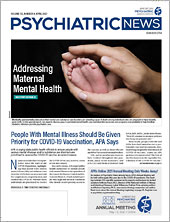I would like to thank Area 4 Trustee Cheryl Wills, M.D., for her assistance in writing this article. She is chair of APA’s Presidential Task Force to Address Structural Racism Throughout Psychiatry.
Upon taking office in April 2020, I decided that APA should undertake a systematic study of diversity and inclusion at APA. When civil unrest erupted in the United States and elsewhere after George Floyd was unjustly killed by a White law enforcement officer on May 25, 2020, I expanded the agenda to address the effects of racism in APA, on patients, and in psychiatric practice.
Each APA president has the privilege of creating presidential task forces that, by definition, report directly to the APA Board of Trustees and are afforded resources, including enhanced staff support, to fulfill the charge. I created the APA Presidential Task Force to Address Structural Racism Throughout Psychiatry and appointed Area 4 Trustee Cheryl Wills, M.D., as chair. My vision was clear: to achieve actionable change through a systematic process that included studying the problem, creating educational resources for members, and identifying actionable items for the Board to deliberate and act on. I decided that the task force’s first year would be dedicated to an anti-Black racism agenda.
I worked closely with APA’s Division of Diversity and Health Equity to recruit leaders to work on this project. I appointed 11 individuals: five members of the Board and six APA members who are subject-matter experts. The combination is essential to the task force’s success. Subject-matter experts share information, and Board members bring an insider’s perspective about the Board and other parts of APA’s governance operations to the table.
It’s been quite a year. The task force has engaged in robust debates about salient topics and reviewed and interpreted data collected from many sources, including surveys of APA members. Using that information, the task force has proposed actionable recommendations for the Board to consider. Assisting them with this work have been more than 15 APA staff members.
The most challenging part of the process involves crafting a final report that contains concisely articulated actionable items. The final report during my presidency will be reported at the Board’s March meeting, which is scheduled to occur as this issue goes to press.
The task force has striven for transparency and member engagement this past year. Regarding the surveys of APA members, for example, there have been three, garnering a total of 1,800 responses, mostly from psychiatrists. The task force has used the survey responses to prioritize its agenda. (The top responses are posted on the task force’s website
psychiatry.org/taskforce.) Also, task force members have met with APA members in a variety of forums to gather and share information about the task force and its work. Members’ input is still welcome via email to
[email protected].
To date, the task force has held four virtual town halls featuring panelists who discussed various aspects of structural racism, including the history of structural racism in medicine and APA; its impact on medical education and psychiatric care; and ways in which structural racism has affected and continues to affect generations of members of minority and marginalized groups, including children and families. The town hall held in February featured a panel of experts who were interviewed by psychiatry residents and fellows about the necessity of diversity and inclusion in psychiatry and residency training along with actions that are conducive to growing a diverse psychiatric workforce (
Psychiatric News). The town hall meetings can be viewed
psychiatry.org/taskforce. The final town hall will be held Saturday, May 1, at 4 p.m. during APA’s online 2021 Annual Meeting.
APA members told the task force that examining structural racism in APA should be its top priority, and the task force established several workgroups to do this. Each workgroup collected and examined data; interviewed key stakeholders; rendered conclusions; and, when indicated, made actionable recommendations to the Board that are conducive to expanding diversity and inclusion within APA. For example, the Workgroup on Assembly Review concluded that the effort to increase diversity in the Assembly should start at the district branch level and that mentorship was one way to influence leadership opportunities in the Assembly. These and other recommendations were supported by the Board at its October 2020 meeting and were presented to the Assembly Executive Committee for further consideration.
The Workgroup on Board Review studied demographic data regarding past and current APA officers and Board members along with relevant sections of the APA Bylaws and Operations Manual. The review process included interviews with past and current APA presidents, minority/underrepresented member trustees, and chairs of the Election Committee. The workgroup concluded that although diversity in APA governance has increased in the past decade, including greater representation of Black psychiatrists, barriers to the inclusion of underrepresented minority members in APA’s leadership persist. At its December 2020 meeting, the Board accepted the workgroup’s report and supported most of its recommendations, including expanding the nominations process for APA officers and trustees and implementing a two-year pilot program for APA campaigns by limiting campaigning to APA resources.
The Workgroup on the Scientific Program Committee examined data pertaining to the diversity of committee members and the number of sessions on diversity, equity, and inclusion issues, and it will present a report on the findings and recommendations to the Board at its March meeting. Also at that meeting, the Workgroup on Components Review will present a report on its thorough review of the components structure and operations and actionable recommendations to increase the diversity of component members.
The Workgroup on Fellow Projects and Leadership engaged APA/APA Foundation fellows as they identified and discussed major matters pertaining to structural racism, diversity, and inclusion. The workgroup also mentored fellows on research projects that pertain to diversity and inclusion. The workgroup presented a brief report to the Board in December 2020 and will report on its progress at the Board’s March meeting.
Cataloging and disseminating information is one of the most important functions of the task force, which is being done by the Workgroup on Resources. Its members update the content on APA’s structural racism web hub; promote town hall meetings and other events; interface with APA members via APA listservs, email, and social media; provide task force summaries and updates; and catalog the activities of APA’s district branches, Areas, councils, committees, caucuses, and allied organizations. The workgroup’s goal is to ensure that everyone will have timely access to information, including important readings, videos, lectures, and other content.
APA’s anti-racism agenda goes beyond the task force’s work and the apology letter issued by the Board in January (
Psychiatric News). Each council has been charged with engaging in an anti-racism project. For example, the Council on Children, Adolescents, and Their Families produced a resource document titled “How Psychiatrists Can Talk to Patients About Race and Racism,” posted
here. The document contains practical content for clinicians who work with patients of all ages. The Council on Advocacy and Government Relations is collaborating with members of the Council on Healthcare Systems and Financing and the Council on Minority Mental Health and Health Disparities to develop a resource document on anti-racist policies that promote access to care. The Council on Minority Mental Health and Health Disparities also collaborated on several position statements that pertain to discrimination against minority and underrepresented groups. They can be accessed
here.
APA has only begun the work that needs to be accomplished. While a presidential task force runs only as long as the term of the president who created it, this vitally important work to the future of APA and psychiatry will continue during the term of incoming President Vivian Pender, M.D., and I will continue my involvement. ■

